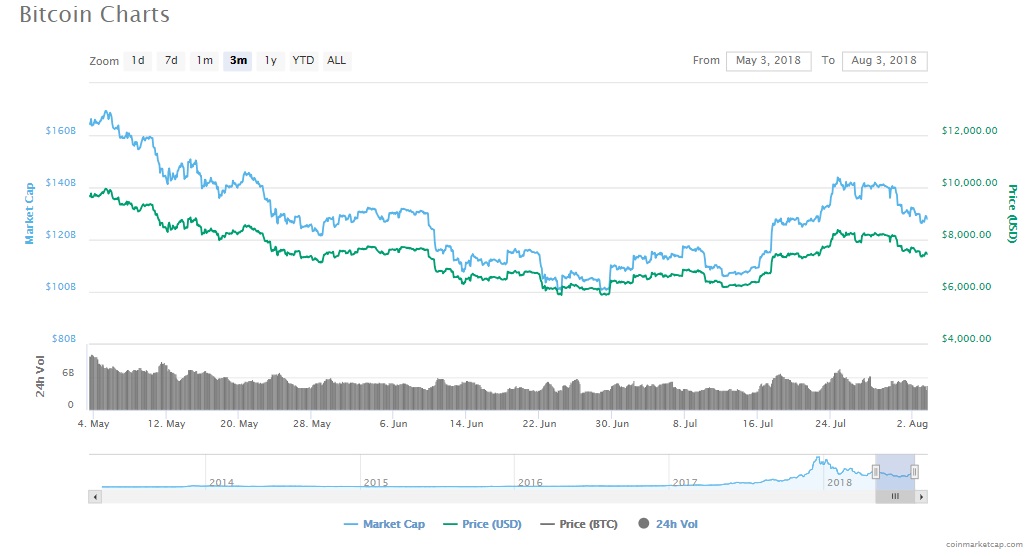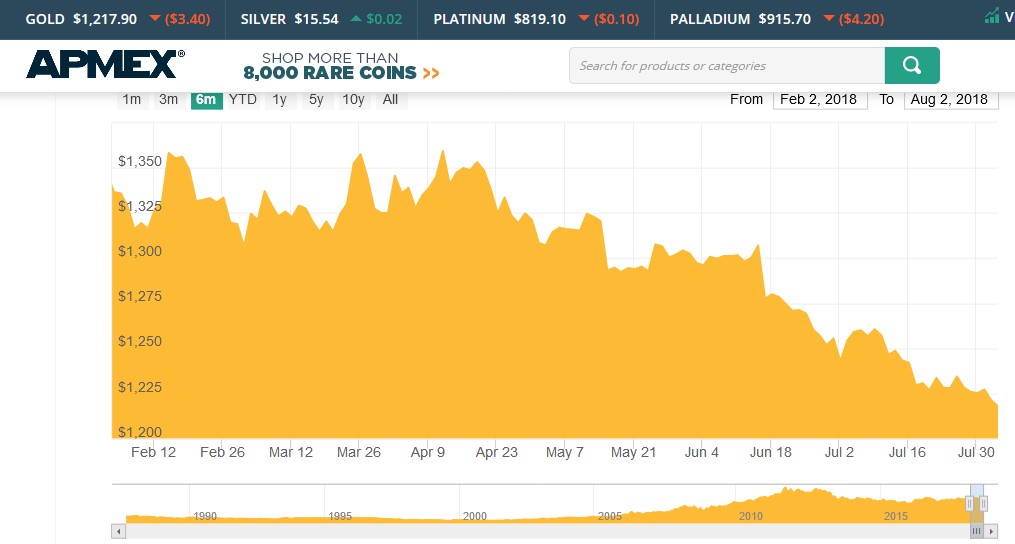The world's two biggest economies are at loggerheads, and it just keeps getting worse. The U.S. is reportedly now considering imposing 25 percent tariffs on $200-billion in Chinese imports, much higher than the 10 percent it had previously indicated. Meanwhile, a recalcitrant China has begun retaliating, and promises not to back down:
"If someone wants a trade war," China's commerce minister has said, "we will fight to the end."
Yet curiously, assets that are supposed to be safe havens have remained indifferent.
In fact, they have been doing just the opposite of what we would expect--bitcoin and gold have lost a lot of ground since trade tensions between the U.S. and its trading partners escalated.

(Click to enlarge)
Source: CoinMarketCap

(Click to enlarge)
Source: APMEX
Can Bitcoin Benefit From Trade Wars?
For years, gold has been considered the pre-eminent safe haven asset. The same can’t be said about bitcoin due to its much shorter history. The argument about bitcoin being considered a safe haven asset is quite fitting when you consider that it was created at the height of the last major financial crisis—in direct response to the numerous shortcomings of the traditional financial system.
It’s not far-fetched to imagine that potential vulnerabilities in a national currency would tend to magnify the strengths of a borderless currency such as bitcoin. Related: Is This Why Bitcoin Prices Dropped?
Opinion about the value of bitcoin as a safe haven asset remains split, with experts like Crypto Asset Management director Tim Enneking and Redwood City Ventures partner Sean Walsh saying that trade wars are not a major catalyst for bitcoin prices.
Still, the two gentlemen concede that bitcoin would likely see significant inflows if a full-scale trade war was to break out.
Other reports suggest that certain demographics are rejecting gold as a safe haven in favor of bitcoin.
The verdict therefore seems to be that trade wars should boost bitcoin prices somewhat and certainly not depress it. Yet, the exact opposite seems to be happening …
The Fed Is To Blame
Looking at gold can help us understand why trade wars are not having the desired effect on bitcoin prices. There are two key factors keeping gold prices depressed:
- Strong dollar
- Rising interest rates/inflation
Gold and the U.S. dollar have been exhibiting strong inverse correlation, and that shouldn’t come as a surprise. When the greenback gets stronger, it takes less of it to purchase dollar-denominated assets like gold.
The converse also happens when it gets weaker. The US Dollar Index has climbed about seven percent since the beginning of the year, leading to a 10-percent drop in gold prices.

(Click to enlarge)
Source: Daily FX
The second reason is not as straightforward but is every bit as powerful.
Gold is not an interest-bearing asset and does not pay any dividends (something Warren Buffett likes hammering home). As interest rates rise, investors prefer to put their money into things like Treasuries, bonds and stocks--and gold becomes less attractive.
Related: Tesla Short Sellers Just Took A $1.7 Billion Hit
But it’s not nominal interest rates per se that affect gold prices; rather, it is real interest rates. Claude Erb’s and Campbell Harvey’s book, The Golden Dilemma, says that real interest rates (nominal rates minus inflation) tend to have a very strong negative correlation with gold (correlation averaged -0.82 from 1997-2012).
Unfortunately for gold investors, this is exactly what has been happening. Inflation has been climbing at the fastest clip in six years. That would be great for gold prices—if the Fed did not keep interfering. The Fed has been raising interest rates to make sure they keep abreast with inflation. The Golden Dilemma says that gold prices tend to increase the most during periods of negative interest rates (when inflation exceeds nominal interest rates). The Fed’s actions have been preventing this from happening.
The same factors keeping gold down can perhaps explain bitcoin’s malaise since it’s also denominated in dollars and also does not bear any interest or pay dividends.
By Alex Kimani for Safehaven.com
More Top Reads From Safehaven.com
















